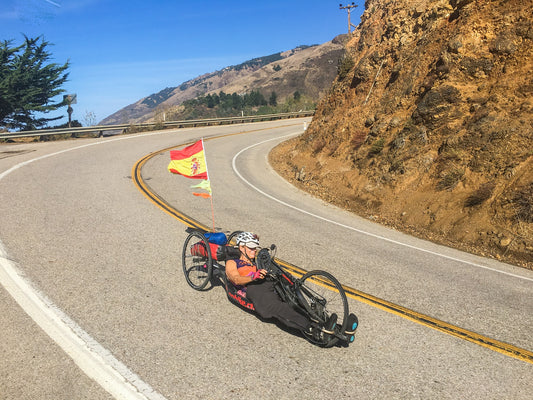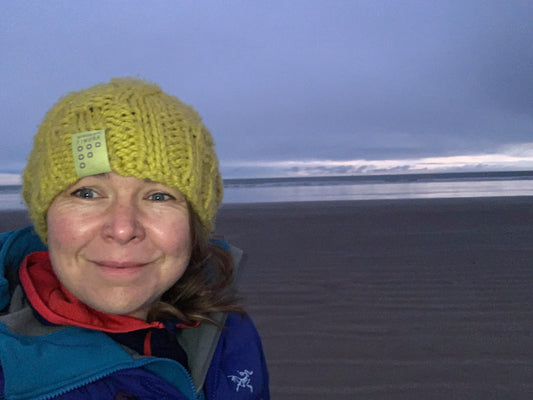Introducing Jen Isherwood

"I am based in Peebles in the Scottish Borders. I have two jobs; I am Head of Outdoor Education at the Edinburgh Academy, I am qualified to teach biking, hiking, climbing and skiing. At school I run a range of activities and expeditions, my passion is to empower young people to develop a growth mindset through adventure - what I describe as an adventure mindset. I can bore you to tears on that!!! Its all about the 4 Ps!!
I also run my own business called FAB - we specialise in teaching an adventure toolkit of skills! Outdoor First Aid, Navigation, leadership etc. I am also a member of Tweed Valley Mountain Rescue Team and have been for a very long time! Over 15yrs!"
Read more about Jen over on her dedicated blog!
The Importance of Outdoor Education

"Helping people develop a growth mindset through adventure is my mission in life. I have found it much easier to explain what a Growth Mindset is by using the following 4 Ps model:
- A participant has a growth mindset - they relish challenge and bounce back from setbacks, they work well with others to achieve the outcomes and offer compassionate responses to others.
- A prisoner has a fixed mindset - they are unable to see the bigger picture and can only see their own discomfort. They fail to look at the world through the lens of anyone else
- A protester has a fixed mindset - they do not listen but continue to voice their own opinion despite the needs of the group/task
- A passenger has a fixed mindset - they happily cruise along on the tail of others success. They offer little but will quickly try and take over when they see that success is guaranteed.
Using the '4 P's', we help young folk to have the vocabulary that describes their mindset. That then gives them choice about changes they can make. We have all been a prisoner and will continue to have times in our lives that push us towards being a protester, but if we know what the target of being a participant is we can move towards it more easily rather than getting stuck.
I use lots of different exercises during an adventurous activity to help folks understand that mindsets are their choice. We look at how we can change our perspective, we can decide what is worth investing our effort into, what can we change, what can't we change. We look at problems having solutions and that facts cannot be changed, so why spend ages moaning about them (an example is the weather, it's a fact - you cannot change it!). We have to be sensitive to this and I spent time training staff and volunteers to help them facilitate these conversations/discussions!
Learning how to operate in a more compassionate way towards the people around you and the environment you are in is also important. We regularly do conservation work as part of our normal activities, operate a leave no trace system etc. We look at how, at different times, people can be in different mindsets and how we can adjust to that in a caring way rather than being judgemental.
Underpinning this is an adventure pedagogy which helps me to design the work I do. Simply put, those involved in the activities I run should have agency over the activity. The activity builds relevant skills transferable to wider life, and the provision of this offers the chance to master skills and that adventure is facilitated. These four capacities are my scaffolding for planning all the work I do.
Book of the Week

You don't need to be a huge cycling fan to know that British Cycling has done extremely well in the last couple of decades. From the Olympics to the Tour de France, the UK has produced some incredible riders and part of that is down to the author of Jen's favourite book. Dr Steve Peters is the resident psychiatrist with the British Cycling and Sky ProCycling teams. Sir Chris Hoy, Bradley Wiggins, Craig Bellamy, Ronnie O'Sullivan and Victoria Pendleton have spoken publically about how Dr Peters' unique model has helped them improve their performance.
Dr Peters takes this programme into the corporate world too, working with anyone from CEOs to students. His approach helps you to understand why you think and act as you do and how to manage your mind to optimise your performance at work and in your personal life.
"
The Chimp Paradox is an incredibly powerful mind management model that can help you become a happy, confident, healthier and more successful person.
The Chimp Mind Management Model is based on scientific facts and principles, which have been simplified into a workable model for easy use".
Music of the Week
We’re building a FINDRA Community Playlist over on Spotify, bringing you music of a rather eclectic variety! From classic dance tunes to lesser-known indie songs, we hope there’s something new in there for you. If you’ve got a favourite you’d like to hear in the playlist, drop us a tweet!
Jen tells us that "Bring me sunshine by Morcambe and wise is my go to mantra when I am doing something tricky! I have lots of great tunes on my playlist but that is my flow tune! Not very sexy huh!" We don't care, Jen! If it motivates you then it all counts!
Whatever you’re up to this week, friends, remember to find your everyday adventure.
Love, Team FINDRA x
#FINDRAeveryday


